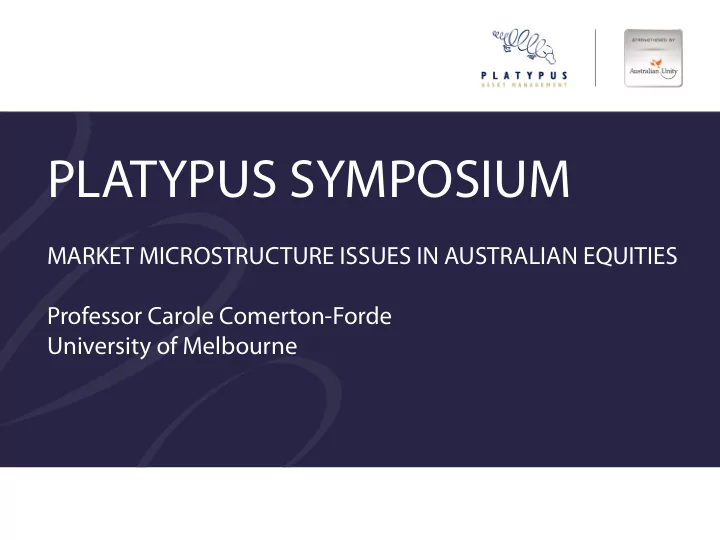

PLATYPUS SYMPOSIUM MARKET MICROSTRUCTURE ISSUES IN AUSTRALIAN EQUITIES Professor Carole Comerton-Forde University of Melbourne
Market microstructure issues in Australian equities Carole Comerton-Forde Professor of Finance 4 March, 2014 www.fbe.unimelb.edu.au www.fbe.unimelb.edu.au
Overview • Evolving market structure − Competition − Dark trading − High Frequency Trading • Impact of changes on market quality • What does it mean for investors? • Expected future trends www.fbe.unimelb.edu.au
Competition • Market has become more complex • Two exchanges: − ASX: 3 order books: 2 lit, 1 dark − Chi-X: 1 order book with lit and dark order types • 19 broker-operated crossing systems − Multi-lateral connections (aggregators) − Bi-lateral connections • Lit exchanges set NBBO • Priority not always “price then time” www.fbe.unimelb.edu.au
Where are trades done? Pre-competition from Chi-X Post-competition from Chi-X Total order book 72.2% Source: ASIC Equity Market Data, Dec 2013 and TRTH
Where are trades done? Pre-competition from Chi-X Post-competition from Chi-X Total order book 72.2% Source: ASIC Equity Market Data, Dec 2013 and TRTH
Growth in dark trading • Two types of dark trading: − Blocks (>$1million) − Below block size dark trades • Launch of ASX Centre Point, broker operated crossing systems and dark algorithms facilitated growth in below block size dark trades • Concerns about too much below block dark trading harming price discovery and liquidity • New regulations introduced May 27, 2013 www.fbe.unimelb.edu.au
Dark and block trading Dark trading rule changes introduced May 27, 2013 Source: ASIC Equity Market Data, Dec 2013
Market fragmentation Source: ASIC Equity Market Data, Dec 2013
What is HFT? • HFT is not a single trading strategy • Uses high-speed computer programs to generate, route and execute orders • Characterised by: − Large volumes of orders, amendments and cancellations − Small positions, high turnover, low margins − Very short holding periods − Typically (but not always) zero inventory overnight www.fbe.unimelb.edu.au
HFT Friendliness: Australia vs the US Criteria Australia US Low latency Fragmentation 2 exchanges 14 exchanges 1 licensed dark pool > 50 ATSs 19 crossing systems > 200 broker-dealers Competition reduced fees Intense fee competition Low explicit fees Cost recovery fee Rebates paid Rebates prohibited ASX200 stocks & ETFs Large universe of liquid stocks High liquidity & ETFs Many high tick stocks / tick Large universe of low tick Small tick sizes constrained stocks stocks Best execution Order protection Level of HFT 2012 Est. 27% 2009 Est. 70%; 2012 Est. 50%
ASIC HFT Taskforce Analysis of HFT vs non-HFT trading HFT Non-HFT Percentage of traders <0.1% >99.1% Percentage of turnover 27% 73% Order to trade ratio 13.7 4.1 Speed of deletion 27ms 31ms Speed of amendment 23ms 9ms % orders below $500 17% 83% Fraction of orders resting < 1 min 81% 78% Fraction of orders resting < 1 sec 35% 16% Source: ASIC Report 331 www.fbe.unimelb.edu.au
What has happened to market quality? www.fbe.unimelb.edu.au
Average order size Source: ASIC Equity Market Data, Dec 2013
Order to trade ratios Source: ASIC Equity Market Data, Dec 2013
Average quoted spreads Source: ASIC Equity Market Data, Dec 2013
Inter-day volatility Source: ASIC Equity Market Data, Dec 2013
What does it mean for investors? • Understanding trading and managing the execution process is critical • Need to understand order types, order routing and broker incentives • Transaction cost analysis (TCA), including venue analysis is essential • Need to contribute to market structure debate and regulation www.fbe.unimelb.edu.au
Expected future trends • More variation in how people search for and interact with liquidity • Further attempts to segment liquidity and preference specific types of order flow • Attempts to create incentives of liquidity provision • Greater provision of tools to support TCA • Proposed move to T+2 settlement • Consideration of competition in clearing www.fbe.unimelb.edu.au
Questions? Carole Comerton-Forde Professor of Finance www.fbe.unimelb.edu.au
Recommend
More recommend